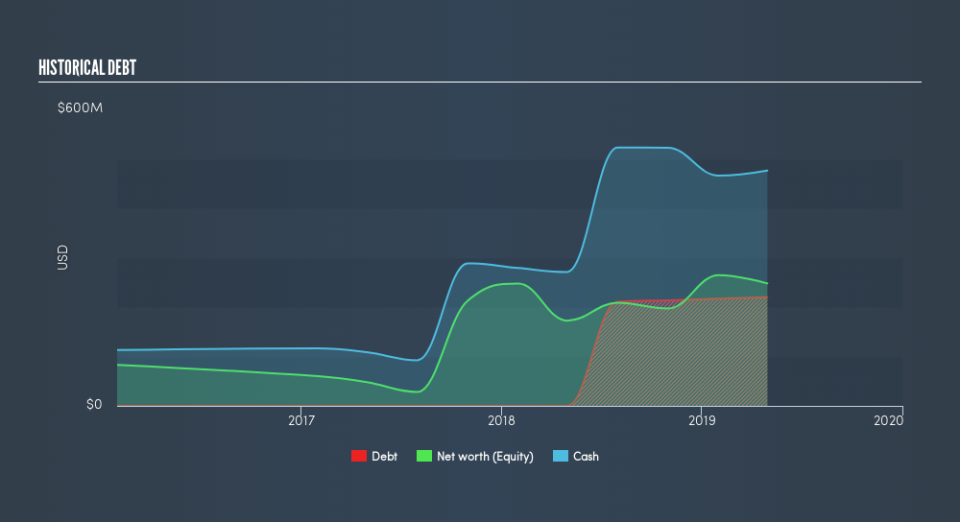Is MongoDB (NASDAQ:MDB) Using Debt Sensibly?

Howard Marks put it nicely when he said that, rather than worrying about share price volatility, 'The possibility of permanent loss is the risk I worry about... and every practical investor I know worries about.' It's only natural to consider a company's balance sheet when you examine how risky it is, since debt is often involved when a business collapses. We can see that MongoDB, Inc. (NASDAQ:MDB) does use debt in its business. But the real question is whether this debt is making the company risky.
When Is Debt A Problem?
Generally speaking, debt only becomes a real problem when a company can't easily pay it off, either by raising capital or with its own cash flow. If things get really bad, the lenders can take control of the business. However, a more frequent (but still costly) occurrence is where a company must issue shares at bargain-basement prices, permanently diluting shareholders, just to shore up its balance sheet. Of course, the upside of debt is that it often represents cheap capital, especially when it replaces dilution in a company with the ability to reinvest at high rates of return. When we think about a company's use of debt, we first look at cash and debt together.
Check out our latest analysis for MongoDB
What Is MongoDB's Net Debt?
The image below, which you can click on for greater detail, shows that at April 2019 MongoDB had debt of US$220.1m, up from none in one year. But it also has US$476.4m in cash to offset that, meaning it has US$256.3m net cash.
A Look At MongoDB's Liabilities
The latest balance sheet data shows that MongoDB had liabilities of US$178.2m due within a year, and liabilities of US$308.2m falling due after that. Offsetting this, it had US$476.4m in cash and US$61.6m in receivables that were due within 12 months. So it actually has US$51.6m more liquid assets than total liabilities.
Having regard to MongoDB's size, it seems that its liquid assets are well balanced with its total liabilities. So while it's hard to imagine that the US$7.78b company is struggling for cash, we still think it's worth monitoring its balance sheet. Succinctly put, MongoDB boasts net cash, so it's fair to say it does not have a heavy debt load! When analysing debt levels, the balance sheet is the obvious place to start. But it is future earnings, more than anything, that will determine MongoDB's ability to maintain a healthy balance sheet going forward. So if you want to see what the professionals think, you might find this free report on analyst profit forecasts to be interesting.
Over 12 months, MongoDB reported revenue of US$306m, which is a gain of 67%. Shareholders probably have their fingers crossed that it can grow its way to profits.
So How Risky Is MongoDB?
By their very nature companies that are losing money are more risky than those with a long history of profitability. And we do note that MongoDB had negative earnings before interest and tax (EBIT), over the last year. Indeed, in that time it burnt through US$38m of cash and made a loss of US$106m. While this does make the company a bit risky, it's important to remember it has net cash of US$476m. That means it could keep spending at its current rate for more than five years. MongoDB's revenue growth shone bright over the last year, so it may well be in a position to turn a profit in due course. By investing before those profits, shareholders take on more risk in the hope of bigger rewards. For riskier companies like MongoDB I always like to keep an eye on whether insiders are buying or selling. So click here if you want to find out for yourself.
When all is said and done, sometimes its easier to focus on companies that don't even need debt. Readers can access a list of growth stocks with zero net debt 100% free, right now.
We aim to bring you long-term focused research analysis driven by fundamental data. Note that our analysis may not factor in the latest price-sensitive company announcements or qualitative material.
If you spot an error that warrants correction, please contact the editor at editorial-team@simplywallst.com. This article by Simply Wall St is general in nature. It does not constitute a recommendation to buy or sell any stock, and does not take account of your objectives, or your financial situation. Simply Wall St has no position in the stocks mentioned. Thank you for reading.

 Yahoo Finance
Yahoo Finance 
